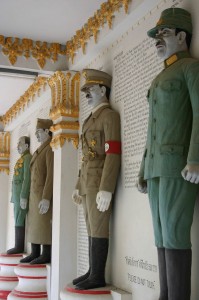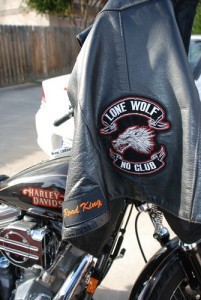 Look behind you. Are you being followed? If the answer is yes, odds are pretty good that you’re a leader. Sure, it could just be paranoia, I suppose. But because you’re reading this, I’m assuming the former.
Look behind you. Are you being followed? If the answer is yes, odds are pretty good that you’re a leader. Sure, it could just be paranoia, I suppose. But because you’re reading this, I’m assuming the former.
As you might expect, writing for Leadership Voices often causes consideration of a very basic question: What is a leader? I mean – a leader in the most elementary sense of the word? Let’s test a definition that I think works, and let’s see where it takes us and what conclusions from it may be drawn. Try this on for size:
A leader is someone who has followers.
That’s not to say, of course, that all leaders are good leaders – but I think it is right to say that all leaders, by the simplest, lowest-common-denominator definition, have followers.
Seems ridiculous, I know, but there are some important lessons for leaders that can be learned from even such a simple idea, and I’ll spend the balance of our time here exploring a few of them. First:
Can you think of an example of a leader who doesn’t have any followers?
Answering this question begins to help us roll back layers of fog around what true leadership is, because it helps us to distinguish principles of effective leadership from the actual leaders themselves. Stated more plainly, it helps us see the difference between personality traits that look, feel and smell “leader-ish” and the real leaders that are actually leading.
Many people in society may be looked upon as having the appearance of a leader: charismatic individuals with forceful, creative, persuasive ideas. People who command armies in battle. Politicians at any variety of levels of government. Coaches and athletes. Movie stars. Certainly we look at heads of large companies as leaders. But are they they leaders? Unless they have followers, then they are only playing a leadership or projecting an image without substance.
Let’s consider two examples of false leaders: the Despot, and the “Lone Wolf”. The Despot is a person who may be the head of a large organization or nation, with perhaps thousands or millions sitting under their rule. The Lone Wolf, on the other hand, is an organization of one. But they have this in common: neither are leaders.
 The first one – the Despot – is an easy concept to grasp: These are bullies that impose their will by means of threat or of force. People do not follow a despot. They may fear him. They may comply with him. But they do not follow him. The despot is a bully who is only as strong as his means of controlling others. And it is there that our first leadership principle from my definition is learned:
The first one – the Despot – is an easy concept to grasp: These are bullies that impose their will by means of threat or of force. People do not follow a despot. They may fear him. They may comply with him. But they do not follow him. The despot is a bully who is only as strong as his means of controlling others. And it is there that our first leadership principle from my definition is learned:
Leaders are not controlling. I’ll dwell more on this in a later article, but for now it is enough to recognize that using threat of force, coercion or manipulation isn’t leadership. Until I revisit this topic at a later date, I hope just stating this idea will ring true for you. But for this article, let’s move forward.
 The second example of “smells like a leader but isn’t” is that of the Lone Wolf: You probably know people who fit this profile. In my life I’ve been the Lone Wolf more often than not. Often in an organization the Lone Wolf is an all-star individual contributor. They may have great ideas. They are possibly charismatic. And, typically, the Lone Wolf is dogmatic, and operates against what may be impossibly high standards, or standards that are frequently changing. He views mission as being more important than team. And in each of those things, the Lone Wolf may be precisely correct (or not!). But the Lone Wolf? Not a leader. Not by a long stretch.
The second example of “smells like a leader but isn’t” is that of the Lone Wolf: You probably know people who fit this profile. In my life I’ve been the Lone Wolf more often than not. Often in an organization the Lone Wolf is an all-star individual contributor. They may have great ideas. They are possibly charismatic. And, typically, the Lone Wolf is dogmatic, and operates against what may be impossibly high standards, or standards that are frequently changing. He views mission as being more important than team. And in each of those things, the Lone Wolf may be precisely correct (or not!). But the Lone Wolf? Not a leader. Not by a long stretch.
Do you remember John McClane? The character portrayed by Bruce Willis in the “Die Hard” movie franchise? Yeah, he’s an unforgettable kind of character. He’s a dangerous man. A man’s man. Tough. Savvy. Sharp wit. And let’s not forget balding, okay? Yes. Balding. That’s important, at least if your hairline resembles mine. And his character is of the sort that we may be drawn to, and we may admire for his singular focus and unquestionable talents with improvised explosives, a Beretta 92, a Zippo lighter and witty use of profanity. John McClane is a man on a mission, and frankly, John McClane doesn’t really care who he kills, how many buildings and vehicles he explodes, or the camaraderie of those that are trying to help him.
 He cares about The Mission. And again – that’s not necessarily a bad thing. But none of those things make John McClane a leader.So: what do you think about the character of John McClane?
He cares about The Mission. And again – that’s not necessarily a bad thing. But none of those things make John McClane a leader.So: what do you think about the character of John McClane?
What makes the Lone Wolf mentality a tempting one for leaders to emulate is that people who are exceptionally strong in their role as Lone Wolf are people that others are inclined to want to follow.
Did you catch that? Let me run it by you again: Strong Lone Wolves are people that attract followers.
So how does that apply to my initial premise that “a leader is someone who has followers”? What is it that would cause a strong Lone Wolf to attract followers and yet not retain them?
This leads us to our second leadership principle that can be deduced from my premise: Leaders care about those that they lead. Do you know what happens to people who follow around John McClane? Worst case, they get shot or blown up. And the best case for a person who would attempt to follow the Lone Wolf? They are made to feel inadequate and in the way, because they can’t match the individual standard that the Lone Wolf has set for himself no matter how strongly they feel about the mission. At the end of the day, the Lone Wolf will drive away his followers because – frankly – the followers are in the way.
And what is the fundamental lesson that a Lone Wolf teaches his followers? Simply this: You are better off alone. The conclusion of that lesson is that even if the Lone Wolf picks up a stray follower here and there along the path, eventually the followers of the Lone Wolf will follow the example they have been taught resulting in their falling away from their “leader”, or they will be abandoned, or perhaps more likely they will be driven away. I will dwell further on this idea in a future article as well, but it is my hope that for now we can agree that none of these outcomes are what we would consider leadership. Which leads me to the third principle of leadership my premise supports: Having the characteristics of strong leadership isn’t what makes you a strong leader. There’s something else.
I’ve given you two examples of non-leaders who appear to be leaders in the form of the Despot and the Lone Wolf, and hopefully you are beginning to see where I am going with this line of thinking. The lessons become more complex when we start to add in the true leaders: those among us who have what can rightly be described as followers. For any of these types of “leaders” it is simple to find examples anywhere along the spectrum of leadership ranging from lots of “lousy” to sometimes “good”, and maybe with an occasional “great” tossed into the mix. Without debating the various ways that we would grade out any of these lousy, good, or great leaders, isn’t it interesting that you already have a criteria in your mind that helps you distinguish lousy from great? By making that distinction, we are able to determine strong and good principles of leadership – which is the primary reason that Leadership Voices was founded in the first place. And it is here that we begin to discover a crucially important characteristic of leadership:
Leaders are accountable to the people they lead.
 We’ve looked at a few examples of non-leaders. Let’s consider the Despot and the Lone Wolf again briefly in the context of an accountability relationship, and this idea will start to make more sense. A Despot is specifically unaccountable to the people under his control – such an idea is fundamental to defining a despotic form of rulership. The people under the rule of a despot are accountable to him – not the other way around. His rule, and that accountability relationship, are enforced by the despot, not by his subjects. Ultimately the despot rules people, and people serve the ruler.
We’ve looked at a few examples of non-leaders. Let’s consider the Despot and the Lone Wolf again briefly in the context of an accountability relationship, and this idea will start to make more sense. A Despot is specifically unaccountable to the people under his control – such an idea is fundamental to defining a despotic form of rulership. The people under the rule of a despot are accountable to him – not the other way around. His rule, and that accountability relationship, are enforced by the despot, not by his subjects. Ultimately the despot rules people, and people serve the ruler.
The Lone Wolf? Almost without exception, the Lone Wolf is accountable to only one of two things: The Mission, or the Lone Wolf himself. The logical conclusion of this is that people who would follow the Lone Wolf must either have a singular focus on The Mission or must strive to meet the standards of the Lone Wolf. The former means in practice that instead of a leader and a follower you simply have two Lone Wolves who share a common purpose. And in the case of the latter, the follower winds up being accountable to the standards of the person they are attempting to follow, but the person they are following is in no way invested in helping the follower be successful – because the Lone Wolf himself is only accountable to those standards he established and to no one else.
And that leaves us with the third category of people we’ve considered, which is the group of actual leaders that are distinguishable because they have actual followers. As we discussed, the range of leaders that comprise this group range from lousy to great using an instinctive but as-yet undiscussed (by me, at least) set of standards. Others have explored these standards and I will continue to do so as well. But for now, I’d like to close with a final leadership principle that our working definition allows, and I’ll leave you with a couple of ideas to consider.
Leaders lead by the consent of their followers.
 I mentioned above a leadership principle that leaders are accountable to the people that they lead. One could as easily conclude that servants are accountable to the people that they serve. And it usually (but not always!) follows that the more effective a leader is at serving those who follow him, the more effective that leader will be in leading his charges.
I mentioned above a leadership principle that leaders are accountable to the people that they lead. One could as easily conclude that servants are accountable to the people that they serve. And it usually (but not always!) follows that the more effective a leader is at serving those who follow him, the more effective that leader will be in leading his charges.
I’m going to explore each of these ideas in greater individual detail in coming weeks, and I’ve presented some simple ideas here without much support in this first installation. But I would ask that you’d consider each of the principles I’ve presented at face value and that you’d explore the truth of them with me in coming weeks:
- Leaders have followers.
- Leaders do not lead by controlling behavior.
- Leaders fundamentally care about those under their leadership.
- Having the characteristics of leadership doesn’t make someone a leader.
- Leaders are accountable to the people that they lead.
- Leaders lead by the consent of those who follow them.
- The strongest leaders are usually those who best serve the people that follow them.
Obviously there is more to being a great leader than simply serving people who consent to your leadership. Were that not the case, it could be said that the strongest leaders are people who offer up the best bribes, perks, gimmicks and toys – and we wouldn’t really have much else to discuss. Leaders are vision-casters. Leaders are encouragers. Leaders are missional. Leaders are focused. Leaders create and refine identities. But before anyone who would lead willingly (or otherwise) can begin to grow into the kind of leader anyone would regard as “great”, it’s important that they might embrace some simple foundations.
Doing so will help the growing leader start to understand the basis of their identity in leadership. And it is in understanding the basis our identity as leaders that I will begin my next installment in this particular series.
Photo credit: Frank Taillandier / Foter.com / CC BY-NC-ND
Photo credit: S Baker / Foter.com / CC BY
Photo credit: Janna McLaughlin / Foter.com / CC BY-NC-ND
Photo credit: theleetgeeks / Foter.com / CC BY-NC-ND
Photo credit: AJC1 / Foter.com / CC BY-NC-SA
Photo credit: eyesore9 / Foter.com / CC BY-NC-ND



Please note: I reserve the right to delete comments that are offensive or off-topic.